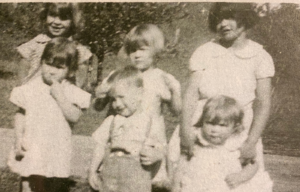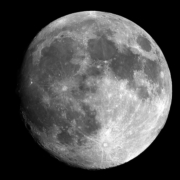Last week one of my oldest cousins died. The oldest? Well, the oldest one still with us. Patricia was 86, the youngest child in this photograph from about 1937. My mother is the little  girl in the middle, back row. My aunt Darlene is in the front row. I called Darlene this evening and we talked about my cousin — who was more like one of Darlene’s sisters. “She always called my mother, ‘Mother,’ and her mother, ‘Mama.’ She did that right up until the end.”
girl in the middle, back row. My aunt Darlene is in the front row. I called Darlene this evening and we talked about my cousin — who was more like one of Darlene’s sisters. “She always called my mother, ‘Mother,’ and her mother, ‘Mama.’ She did that right up until the end.”
The conversation made me think about how the older people in our lives are repositories of history, of story, and it made me think about how much of that history dies, untapped.
Patricia had a son one year older than I, and another son, one year younger. Her mother, Violet, was like a second mother to my mother. I don’t think we saw a lot of Patricia’s family when I was young, though I have vivid memories of their collie, Shep.
I knew the “Mother/Mama” story. I didn’t know that my cousin’s favorite food was pierogis. My aunt Darlene is making a batch of them to take to the dinner after the graveside service. “She won’t get to eat any, but it’s the last time I can make them for her, so I’m doing it.” I remember my aunt Violet’s cabbage rolls (they are one of my specialities). But if I ever had pierogis, I don’t remember. So, I told my aunt I’d make them, too. She told me how she makes them — in great detail — and then said, “You can find a recipe on-line.”
https://www.kingarthurbaking.com/recipes/homemade-pierogi-recipe

I didn’t have all the ingredients on hand, but they turned out pretty yummy anyway 🙂
I thought of that poem by Grace Paley, “The Poet’s Occasional Alternative,” about making a pie instead of writing a poem.
I also thought of this short poem, though it isn’t especially appropriate to the occasion:
On the Death of Friends in Childhood
We shall not ever meet them bearded in heaven,
Nor sunning themselves among the bald of hell;
If anywhere, in the deserted schoolyard at twilight,
Forming a ring, perhaps, or joining hands
In games whose very names we have forgotten.
Come, memory, let us seek them there in the shadows.
—Donald Justice (1925-2004)
 It’s been two weeks of dodging my work and trying to walk away from images in the news. But I’m pleased to recommend poet Sharon Bryan’s poetry blog and its new series of conversations, often on the very topics I’d most like to avoid.
It’s been two weeks of dodging my work and trying to walk away from images in the news. But I’m pleased to recommend poet Sharon Bryan’s poetry blog and its new series of conversations, often on the very topics I’d most like to avoid.





 girl in the middle, back row. My aunt Darlene is in the front row. I called Darlene this evening and we talked about my cousin — who was more like one of Darlene’s sisters. “She always called my mother, ‘Mother,’ and her mother, ‘Mama.’ She did that right up until the end.”
girl in the middle, back row. My aunt Darlene is in the front row. I called Darlene this evening and we talked about my cousin — who was more like one of Darlene’s sisters. “She always called my mother, ‘Mother,’ and her mother, ‘Mama.’ She did that right up until the end.”